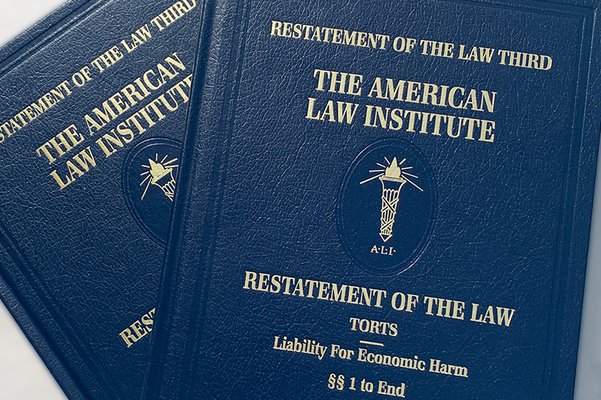Restatements of the Law
The Restatements of the Law are a set of treatises on legal topics meant to inform lawyers and judges about general principles of common law. They are published by the American Law Institute, an organization of judges, legal academics, and practitioners founded in 1923. The Restatement Second included the elements of tortious interference for the first time in 1979 although the tort has been recognized since Lumley v. Gye (1853) 118 Eng. Rep. 749 (Q.B.).
Restatement (Second)
The Restatement (Second) defined tortious interference with a contract as occurring when:
- One who intentionally and improperly interferes with the performance of a contract (except a contract to marry);
- between another and a third person;
- by inducing or otherwise causing the third person not to perform the contract;
- is subject to a liability to the other
- for the pecuniary loss resulting to the other from the failure of the third person to perform the contract.
Restatement Second, Torts § 766.
Restatement (Third)
A lot of court decisions have discussed tortious interference since 1979. In late 2020 the American Law Institute released the Restatement of the Law Third Torts: Liability for Economic Harm. The Restatement (Third) altered the elements of tortious interference.
The Restatement (Third) now states:
A defendant is subject to liability for interference with contract if:
- a valid contract existed between the plaintiff and a third party;
- the defendant knew of the contract;
- the defendant engaged in wrongful conduct as defined in Subsection (2);
- the defendant intended to cause a breach of the contract or disruption of its performance;
- the defendant’s wrongful conduct caused a breach of the contract or disruption of performance; and
- the plaintiff suffered economic loss as a result.
Restatement Third, Torts § 17 (1).
In addition to modifying the definition of interference with a contract, the Restatement (Third) eliminated the term “improper” and began using the phrase “wrongful conduct.” Section 17 (2) now defines “wrongful conduct” as occurring in three narrow instances:
Conduct is wrongful for the purposes of this Section if:
- the defendant acted for the purpose of appropriating the benefits of the plaintiff’s conduct; or
- the defendant’s conduct constituted an independent and intentional legal wrong; or
- the defendant engaged in the conduct for the sole purpose of injuring the plaintiff.
Restatement Third, Torts § 17 (2).
The Restatement (Third) eliminated several privileges previously recognized by the Restatement (Second). Section 20 of the Restatement (Third) sets for the remaining privileges:
Section 20 Interference with Contract: Privileges
Conduct that otherwise would subject a defendant to liability under this Chapter is privileged if it consists of:
- lawful disclosure of truthful facts to another;
- lawful and good-faith efforts to protect a legal interest; or
- lawful and good-faith efforts to protect an economic interest in the contractual relationship at issue.
Restatement Third, Torts § 20.
“Competition” is no longer a privilege to interference because such competition will only rise to the level of liability for either tort if the competitive conduct meets the narrow definitions of “wrongful.”
Interference with Economic Expectation
The Restatement (Third) recognizes two torts related to tortious interference – tortious interference with contract and tortious interference with economic expectation. It defines interference with economic expectation as follows:
Section 18 Interference with Economic Expectation
A defendant is subject to liability for interference with economic expectation if:
- the plaintiff had a reasonable expectation of an economic benefit from a relationship with a third party;
- the defendant committed an independent and intentional legal wrong;
- the defendant intended to interfere with the plaintiff’s expectation;
- the defendant’s wrongful conduct caused the expectation to fail; and
- the plaintiff suffered economic loss as a result.
Restatement Third, Torts § 18.
Importance
The Restatement is not law but it is based on actual court opinions from various state and federal courts over the past 43 years. The latest Restatement shows how this tort has evolved since that time. Many judges recognize the Restatement as persuasive legal authority. Advocates may therefore want to cite the definition in the Restatement (Third) in their briefs and arguments in litigation, especially if it is favorable to their position.
A hard copy of Restatement of the Law Third Torts: Liability for Economic Harm can be purchased from Thompson Reuters. It is also available on Westlaw with a premium subscription.
About the Firm: The Minnesota tortious interference attorneys of Trepanier MacGillis Battina P.A. frequently litigate these claims. They can be reached at 612.455.0500. TMB is a business law firm located in Minneapolis, Minnesota.




